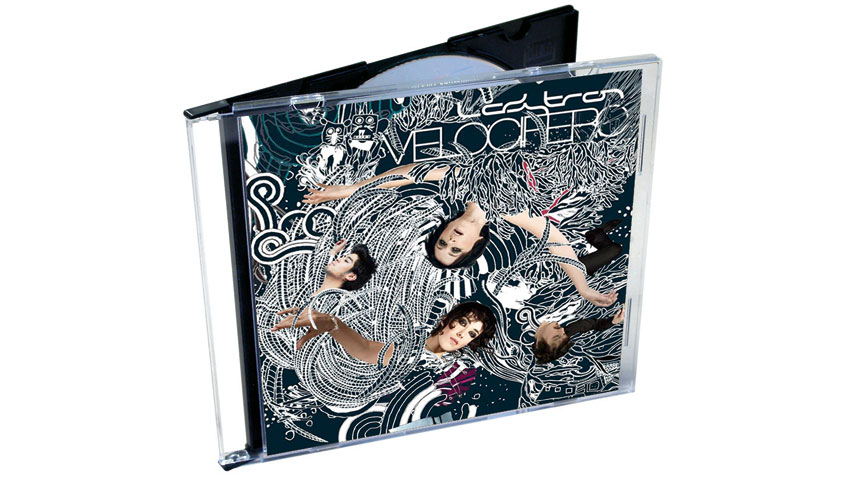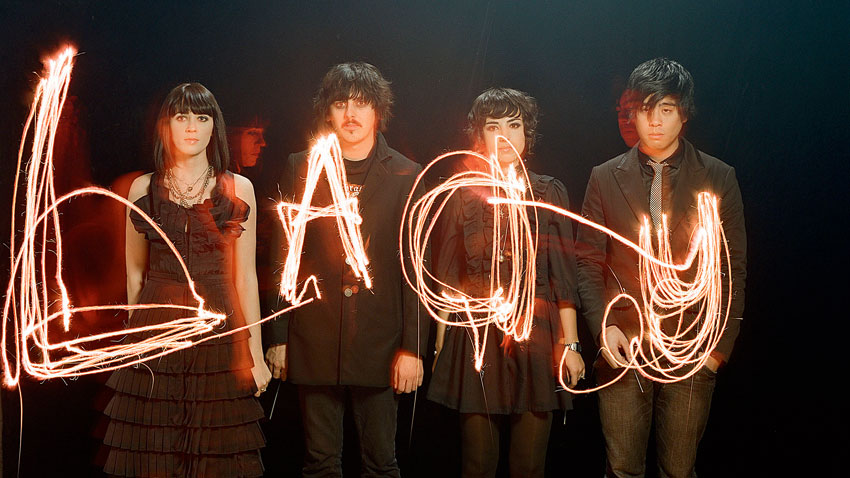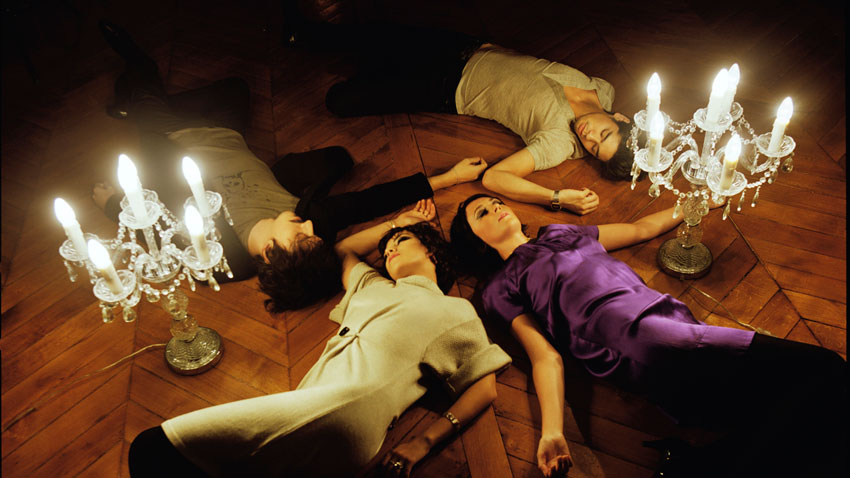Classic album: Daniel Hunt on Ladytron's Velocifero
The fourth album from this eclectic electropop foursome saw them moving in all kinds of new directions

After they dropped the career-saving Witching Hour back in 2005, Ladytron took a three-year break before their fourth album follow up, Velocifero.
Holing away in the luscious surrounds of a luxury studio in Paris, the quartet, made up of vocalists Helen Marnie and Mira Aroyo and synth/production whizzes Daniel Hunt and Reuben Wu, got busy putting their hearts and souls into some new music. They wanted to build on their previous good work, and hone their increasingly experimental and mature song-writing skills.
Having cast off the trendy and limiting ‘electroclash’ tag, they continued to explore further into what reviewers at the time would uniformly describe as a much icier and bleaker sound.
Blending goth, techno, glam, indie, and new wave, with haunting lyrics and dense production, Velocifero would ever so slightly eclipse Witching Hour as the band’s crowning achievement.
“We wanted to consolidate what we had achieved with the first three albums,” says Daniel Hunt. “In particular, the third, Witching Hour, which was a huge leap.
“The longer a group works together, the further you get into your own universe. Outside influences become less and less important.”
The resulting album was filled with contrasts. With dark and light. Shadow and sunshine. At one moment you have the post-punk glory of I’m Not Scared, and then the soaring bass rumble of The Lovers. Tracks like the Bulgarian kids TV show theme update Kletva catch you off guard and Predict the Day strips everything back to showcase their most minimal arrangement to date.
Get the MusicRadar Newsletter
Want all the hottest music and gear news, reviews, deals, features and more, direct to your inbox? Sign up here.
“We learned on the previous record to push things further,” says Hunt. “To test the extremes of how far we could go with a track, even if the end result isn’t ultimately used. We had this basic philosophy of always hearing an idea out, regardless of whether your instincts tell you it is going to work or not.”
Ladytron are back in the studio again and promise their first album in seven years in February. The new single, The Animals, is out now and features a remix by Erasure’s Vince Clarke. For now, though, join Daniel Hunt as he takes you through Velocifero track by track.

Black Cat
“This album is cut from similar cloth to [2005’s] Witching Hour, but it is harder, much denser, darker in general, which is unsurprising after you’ve just come back from two years straight on the road. Plus, we were making it during the financial crisis.
“I love this track, though. And starting shows with it was so exciting. This is one of the ones where Mira raps in her native Bulgarian. By this track she had really perfected it.
“She prefers to sing in English, though, and this was the last time she did a vocal like that. Maybe in the future there’ll be more.”
Ghosts
“This one has something special, it still gets me. It was the first tune we had ready for the album, and had been played with a little on the Witching Hour tour in soundchecks, but never performed.
“This has an improbably long held organ chord at the beginning - I can’t remember what we were even thinking with that.
“I guess Ghosts is a little different to what we’d done before. When writing it, it always reminded me of ['60s psych rockers] Sharon Tandy with the Fleur De Lys, but then the end result doesn’t sound too similar…
“I’d also like it on the historical record that this came out years before any of that ‘sorry, not sorry’ business.”
I'm Not Scared
“This might be my favourite song on the record. Michael Patterson did a wonderful job with the mix.
“We worked on it first in this wonderful studio in Paris. Obviously there’s a strong argument for making records in unspectacular places with as little distraction as possible, and we have done that too, but there’s also nothing like taking a break from comping vocals and going across the street for oysters, or finishing a session and heading straight for Le Baron or wherever. We made the most of our time there, certainly.
“The recording itself was sometimes a little difficult, though, and we ultimately had to take the session away from the producer, who was having some problems in his personal life, and finish the mix in Los Angeles with Michael Patterson.”
Runaway
“This was supposed to be the hit. Listening back now, it should’ve been. When we were recording this, it felt like a hit. It wasn’t gonna be the first single, but it felt like the one that was gonna crossover. Other people thought that too. For whatever reason, it didn’t really happen. It was a popular song among our audience, but it wasn’t like it became a proper smash hit or anything.
“I don’t think it’s underrated within our audience, but I think it’s something that we could have done a lot more with. Every band has this story, though.”
Season of Illusions
“Most of the tracks were in decent shape from our own studios before we went to Paris, but a few, like Ghosts and Season of Illusions, really took off once we were working there.
“Mira’s songwriting was really coming into its own by the third and fourth albums, too, and this might be my favourite of hers.
“When we first started, I was the only one who really had any experience. And then, album by album, everyone was putting in more songs and getting better and better.
“By then, Mira was getting really good at writing, and Season Of Illusions is one of our favourite things we’ve done. She’d done other stuff before that, but at that moment this was up there with the best we’d got.
“Normally she was doing these kind of rap-y vocals in Bulgarian. Then at some point she started writing in English and writing more and more melodic songs.
“She was a little bit in a pigeonhole of just doing these really unique rapping tracks on each album, so by the fourth one she had an urge to do something beyond that. She’s lived in England most of her life.”
She was a little bit in a pigeonhole of just doing these really unique rapping tracks on each album, so by the fourth one she had an urge to do something beyond that.
Burning Up
“This was one of many ‘not quite’ singles on Velocifero. It ended up having a new lease of life on the [housing market crash movie] Big Short soundtrack - which I suppose is pleasing symmetry, given my earlier comment about making this during the financial crisis.
“When we were recording it, in 2007, it was the last summer of calm before the neoliberal bubble burst. To think back to that feels eerily nostalgic now; it was the last moment when things seemed ‘normal’ (they obviously never were).
“Listening back, the record sounds of its time, but also sticks out a mile in some respects.”
Kletva
“This is a cover of a Bulgarian singer songwriter from the 1970s who Mira’s family knew [Kiril Marichkov]. He actually met us at our first show in Sofia in 2003.
“It’s a great song. He remarked that Mira’s accent on the track made her sound like a hillbilly, or something like that.
“A video exists of us performing this on the set of a children’s TV show, which might see the light of day, eventually.”

They Gave You a Heart, They Gave You a Name
“This one, I feel, was a little bit neglected - It was a good song, but didn’t get as much attention in the studio as the others.
“We really began to hit a squeeze with the time we had available, and I always thought we could’ve gone much further with that one.
“With hindsight we could’ve kept it back for another record.”
Predict the Day
“This one has very different production to the rest of the record, and was mostly put together by Reuben and Helen. They’d tried something quite different to anything we’d done up to that point.
“When we started playing it live, it kinda went up a level, too, as tracks tend to do. You’ll have a version in the studio and then you’ve toured it for a year and it ends up in a different place. This track developed beyond the version here.
“The album version’s production is very minimal, while the rest of the album is very dense. This is a bit of respite [laughs].”
The Lovers
“Some people at the label wanted this as a single. We didn’t agree. Listening to it now, I think that they were right.
“I feel like the album is very dense and there were obvious singles on it. This one was one of the best tracks on it. I don’t know why it wasn’t one.
“We were pushing tracks further and further to the end of the album. A lot of reviews at the time were saying that this was one of the ones that we were doing that was interesting. Maybe we underrated it.
“To be honest, this song is most like what is on the new album. It was just that we did so much stuff in a short space of time back then.
“This track just came up really quickly. It’s buried in this sea of reverb and has this really eerie sensation to it. The new single [The Animals] is kinda cut from the same cloth, as it’s as dark as that.
“One of our labels in Germany were demanding that this should have been the single, but we already had Ghosts and Runaway and we didn’t need it. In hindsight we should have made a video for it.”
Deep Blue
“This was actually two tracks, initially. Mira had a song already demoed and Reuben had a very musically different track without a vocal. I could imagine them together. So, as an experiment, I decided to take Mira’s song and combine it with Reuben’s track. It became more than the sum of its parts in the process.
“I think this is the closest yet to a definitive album. Tracks like Deep Blue helped that. Witching Hour took many by surprise because it was so different to the previous two records. We had changed a lot. But on Velocifero we were already refining what we had evolved into.”
I think this is the closest yet to a definitive album. Tracks like Deep Blue helped that. Witching Hour took many by surprise because it was so different to the previous two records. We had changed a lot. But on Velocifero we were already refining what we had evolved into.
Tomorrow
“This is one of my favourites. We had it for a few years prior and it went through various reinventions.
“The video by Neil Krug was something really special, too. We were up at Montserrat in Catalunya, but we had no idea what Neil was going to do with the film.
“I’ve no idea why this one is so late on the record, or what we were thinking by putting it there, as it’s one of the strongest singles we ever put out. We were often doing the opposite of what we were advised. Maybe this was one of those occasions.”
Versus
“Helen and I did this like a duet. Everyone in the studio was a little stunned when the first vocals went down. We received some compliments from people I really respect about this one. I’m still very proud of it.
“I’m proud of the album. It might be our best. I would normally say Witching Hour, and most of the audience seem to agree. Witching Hour is definitely better produced, it is a special record. But I also think this one had a power to it, which was perhaps overlooked at time of release.
“It wasn’t easy to make either, or cheap - and at any moment it felt like the whole project could collapse.”
For tour dates, interviews, and up-to-date info on the forthcoming new album, head to the official Ladytron website.


Future Music is the number one magazine for today's producers. Packed with technique and technology we'll help you make great new music. All-access artist interviews, in-depth gear reviews, essential production tutorials and much more. Every marvellous monthly edition features reliable reviews of the latest and greatest hardware and software technology and techniques, unparalleled advice, in-depth interviews, sensational free samples and so much more to improve the experience and outcome of your music-making.
"Reggae is more freeform than the blues. But more important, reggae is for everyone": Bob Marley and the Wailers' Catch a Fire, track-by-track
“Part of a beautiful American tradition”: A music theory expert explains the country roots of Beyoncé’s Texas Hold ‘Em, and why it also owes a debt to the blues










